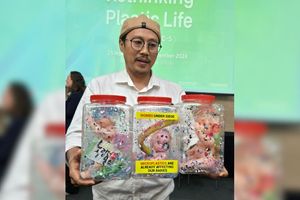World races against own 2024 deadline for first global treaty on ending plastic pollution

There were informal meetings by delegates to discuss the chair’s draft to ensure that the outcome points to one goal—ending plastic pollution
In Busan, South Korea
It was Espen Barth Eide, President of the Fifth Session of the United Nations Environment Assembly (UNEA 5), who gave the go-ahead for a historic draft resolution in Nairobi in March 2022, after countries agreed it was time for a global treaty to end plastic pollution.
Delegates from more than 175 countries applauded enthusiastically.
At the time, a two-year deadline was set to allow countries to negotiate and agree what clauses should be included in the treaty before it is ratified.
We are in 2024, and the deadline is here.
Should it be passed in Busan, South Korea today, history will be made and delegates here compare it to the famous Paris Agreement.
Overlooking Jangsan Mountain is the Busan Exhibition and Convention Centre (BEXCO) where negotiations have been happening in the past week.
Earlier on Friday, there were jitters about whether the Intergovernmental Negotiating Committee chairperson, Louis Vayas Valdivieso, would send out the first draft of the agreed clauses.
A few minutes to 4pm, the first non-paper was sent to delegates and reactions of both hope and disappointment were written on envoys’ faces.
On Saturday, there were informal meetings by delegates to discuss the chair’s draft to ensure that the outcome points to one goal—ending plastic pollution.
Dr Ayub Macharia, Director, Environmental Education, Information and Public Participation at the National Environment Management Authority (Nema), told the Nation that the non-paper is “not bad”, adding that it is still work in progress.
The 24-page document is still bracketed, meaning that some issues have not been agreed on by all parties and should be resolved before the final paper is adopted.
Some of the articles with brackets include Article 5, which deals with the production and design of plastics – a contentious issue that civil societies on Friday called for an overhaul, urging parties to rethink the aspect of plastics production.
Anthony Agotha, Climate and Environment Ambassador for the European Union External Action Service, said that the era for the world’s freedom to pollute is over.
“We need those technologies on waste management as well as technology transfer, but mopping the floor when the tap is open is useless,” said Agotha.
“This is not about demonising plastic. We love plastic because it makes our planes and cars to be lighter but we have to get rid of the polluting plastic that is basically choking the oceans and ruining our health,” he added.
Hellen Kahaso, Project Lead Pan-African Plastic Project at Greenpeace Africa, told the Nation that the first non-paper is a weak attempt by the chair to agree on a treaty and that it lacks most elements that will make it ambitious and binding.
“We are happy that there is an article on production and we hope that that will stay in the final treaty, but we see that there are things like chemicals of concern that have not featured, which is a big red flag. We hope that the treaty will call for a deliberate ban for chemicals that have been proven to be hazardous,” she said.
Kahaso explains that one of Africa’s wish lists on finance has not been explicitly tabled in the non-paper. All 55 countries in Africa, through the Africa Group on Negotiators, had put out a conference paper on finance that had been backed by 126 member states outside Africa.
“We hope that the chair will be able to incorporate this so that we have enough resources for developing nations to implement this treaty once it is ratified,” said Kahaso.
Other contentious issues are around supply and production, where most countries want significant calls for production reduction but the draft paper acknowledges sovereign rights of states as long as production is done sustainably.
“We do not want to come out of Busan with a waste management treaty, there is pressure in the room to finalise and come up with a deal. We don’t want just a deal, but we want a deal that will end plastic pollution,” said Kahaso.
In an interview with the Nation, Panama’s Head of Delegation, Juan Monterrey, called out petrochemical industries that vouch for recycling, saying that it is a form of greenwashing.
“We will not accept industries to rule the outcomes for these negotiations. Let’s be clear, recycling was an invention of the industry itself to perpetuate itself in power and make profit on the backs of our health and that of our ecosystem,” he said.
“Our oceans will be oceans of plastic instead of sea life if we don’t set targets that address this.”





